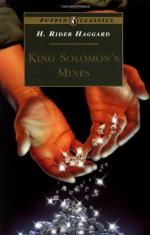“How dost thou know that, Umbopa?” I asked sharply, for I did not like his mysterious ways.
He laughed. “I dreamed it in the night, white men;” then he too turned on his heel and went.
“Now what,” said Sir Henry, “is our black friend driving at? He knows more than he chooses to say, that is clear. By the way, Quatermain, has he heard anything of—of my brother?”
“Nothing; he has asked everyone he has become friendly with, but they all declare that no white man has ever been seen in the country before.”
“Do you suppose that he got here at all?” suggested Good; “we have only reached the place by a miracle; is it likely he could have reached it without the map?”
“I don’t know,” said Sir Henry gloomily, “but somehow I think that I shall find him.”
Slowly the sun sank, then suddenly darkness rushed down on the land like a tangible thing. There was no breathing-space between the day and night, no soft transformation scene, for in these latitudes twilight does not exist. The change from day to night is as quick and as absolute as the change from life to death. The sun sank and the world was wreathed in shadows. But not for long, for see in the west there is a glow, then come rays of silver light, and at last the full and glorious moon lights up the plain and shoots its gleaming arrows far and wide, filling the earth with a faint refulgence.
We stood and watched the lovely sight, whilst the stars grew pale before this chastened majesty, and felt our hearts lifted up in the presence of a beauty that I cannot describe. Mine has been a rough life, but there are a few things I am thankful to have lived for, and one of them is to have seen that moon shine over Kukuanaland.
Presently our meditations were broken in upon by our polite friend Infadoos.
“If my lords are rested we will journey on to Loo, where a hut is made ready for my lords to-night. The moon is now bright, so that we shall not fall by the way.”
We assented, and in an hour’s time were at the outskirts of the town, of which the extent, mapped out as it was by thousands of camp fires, appeared absolutely endless. Indeed, Good, who is always fond of a bad joke, christened it “Unlimited Loo.” Soon we came to a moat with a drawbridge, where we were met by the rattling of arms and the hoarse challenge of a sentry. Infadoos gave some password that I could not catch, which was met with a salute, and we passed on through the central street of the great grass city. After nearly half an hour’s tramp, past endless lines of huts, Infadoos halted at last by the gate of a little group of huts which surrounded a small courtyard of powdered limestone, and informed us that these were to be our “poor” quarters.
We entered, and found that a hut had been assigned to each of us. These huts were superior to any that we had yet seen, and in each was a most comfortable bed made of tanned skins, spread upon mattresses of aromatic grass. Food too was ready for us, and so soon as we had washed ourselves with water, which stood ready in earthenware jars, some young women of handsome appearance brought us roasted meats, and mealie cobs daintily served on wooden platters, and presented them to us with deep obeisances.




